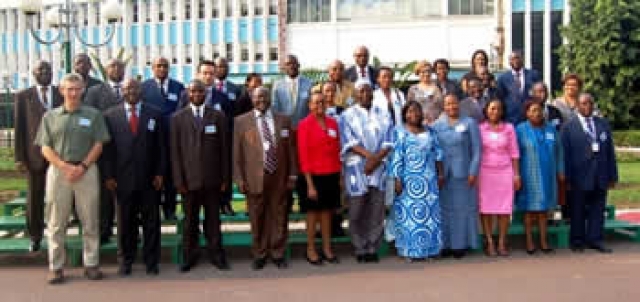Research is vital for disease prevention and control – Dr Sambo
 Brazzaville, 17 November 2011 -- The results of research can help countries to formulate policies to address the menace of diseases and other barriers to health including key determinants such as the environment, access to clean water, food safety, nutrition, illiteracy, gender, the global financial crisis and extreme poverty.
Brazzaville, 17 November 2011 -- The results of research can help countries to formulate policies to address the menace of diseases and other barriers to health including key determinants such as the environment, access to clean water, food safety, nutrition, illiteracy, gender, the global financial crisis and extreme poverty.
This was stated by WHO Regional Director for Africa, Dr Luis Sambo, in a message to the 25th session of the African Advisory Committee on Health Research and Development (AACHRD) which opened on Thursday in the Congolese capital.
“Evidence from research will provide us with the tools to address these nagging health issues. Evidence underpins the definition of priorities and the measurement of results, and is thus essential for formulating health strategies at both national and global levels”, Dr Sambo said in the message delivered by the Deputy Regional Director, Dr Matshidiso Moeti.
The Regional Director pointed out that results from well conducted research help reduce the “know-do” gap by providing innovative ways of addressing long standing problems, as well as new or emerging conditions. Also, populations need access to reliable information on health risks and how to avoid them. He commended members of the committee for the policy advice they had provided over the years to WHO and Member States in health promotion, disease prevention and the management of disease conditions.
Dr Sambo said that the ongoing session of the (AACHRD) should look into issues such as : how WHO’s technical programmes would better respond to the operational needs of countries, and the sharing, with all stakeholders, of the results of the work Member States were doing with partners. Also worthy of the committee’s attention is the need to give more prominence to ethical and regulatory considerations, given the inequitable access to health services and the poor protection of the human rights of research participants in many countries in the region.
All these, he said, call for strengthened partnerships and collaboration – personified by the African Health Observatory, a collaborative platform created at the Regional Office to support and facilitate the effective generation and utilization of data by all stakeholders. Dr Sambo hoped that, with time, the Observatory would develop into a comprehensive Regional information hub for research about health.
The 25th session of the (AACHRD) is being attended by Dr Manuel da Silva Caetano (Angola), Prof. Jean-Baptiste Nikiema (Burkina Faso), Dr Naomi Seboni (Botswana), Prof. Amaboo Dhai (South Africa), Dr Edna Viegas (Mozambique), Dr Salim Abdulla (Tanzania) Prof Germano Mwabu (Kenya) and Dr Portia Manangazira (Zimbabwe).
Note to Editors:
The African Advisory Committee on Health Research and Development (AACHRD) is a multidisciplinary body of experts set up in 1979. It has the consultative mandate to help the WHO Regional Office for Africa contribute to “shaping the research agenda and stimulating the generation, translation and dissemination of valuable knowledge”. The composition and terms of reference of the committee were revised in 2011. AACHRD’s principal brief is to advise the WHO Regional Director for Africa on matters of research related to health development policies and strategies.
For more information, please contact:
Dr Peter Ndumbe – Tel: +47 39158 – E-mail: ndumbep [at] afro.who.int (ndumbep[at]afro[dot]who[dot]int)
Samuel Ajibola – Tel : +47 241 39378 – E-mail: ajibolas [at] afro.who.int (ajibolas[at]afro[dot]who[dot]int)


